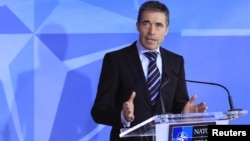BRUSSELS —
NATO has authorized the deployment of a missile defense system to Turkey in response to the continuing violence in Syria and concern its government might resort to using chemical weapons. Alliance foreign ministers formalized the decision in Brussels on Tuesday.
Sarin
VX
Mustard Gas
Source: CDC
Officials say three NATO countries will deploy American-made Patriot anti-missile batteries in southeastern Turkey during the next several weeks. Troops from the United States, the Netherlands and Germany are to set up and run the systems, which officials say will be loaded with non-explosive projectiles to intercept incoming short-range missiles.
The computer-controlled system usually has less than a minute-and-a-half to prevent a potentially deadly missile strike.
Suspected Syrian Chemical Weapons
Suspected Syrian Chemical WeaponsSarin
- Man-made highly toxic odorless, tasteless, colorless nerve agent
- Possibly used during Iraq-Iran war
- Exposure can be by inhalation, ingestion and skin absorption; people can recover with treatment form mild or moderate exposure
VX
- Odorless, tasteless man-made nerve agent; most potent of all nerve agents
- Slow to evaporate, can last for days on objects
- Exposure can be through skin contact or inhalation; people can recover with treatment for mild or moderate exposure
Mustard Gas
- Chemical warfare agent that causes skin blisters and mucous membranes
- Sometimes odorless, sometimes smells like garlic, onions or mustard
- Exposure can be by inhalation, ingestion or skin contact
- Vapor released in the air can be carried long distances; exposure not usually fatal
Source: CDC
NATO member Turkey first asked for help after Syrian army shells landed on its side of the border in October, near rebel strongholds. NATO Secretary General Anders Fogh Rasmussen says concerns that Syria's beleaguered government might resort to using chemical weapons against the rebels added urgency to the issue. He called any use of chemical weapons “completely unacceptable,” and said it would cause “an immediate reaction.”
NATO officials emphasize that the Patriot system will have no offensive capability, and there is no plan to intervene in the Syrian conflict. A statement issued Tuesday specifies that it is not a first step toward creating a no-fly zone in Syria, which some advocates have called for.
Still, Syria's ally, Russia, has expressed concerns about the deployment. Russian President Vladimir Putin criticized the plan during a visit to Istanbul on Monday, saying the October strike was an accident and that Syria's government is in no position to attack its neighbors.
Secretary General Rasmussen says he and NATO ministers have tried to reassure Russian Foreign Minister Sergei Lavrov, who was in Brussels to meet with the NATO foreign ministers. Rasmussen says Russia should not be surprised that NATO is helping to defend an ally, and that the deployment of the anti-missile system could have a positive impact even if it is never used.
“Actually, I do believe that a deployment of Patriot missiles will serve as an effective deterrent, and that way deescalate the situation along the Syrian-Turkish border," he said.
Related video report by Henry Ridgwell:
Related video report by Henry Ridgwell:
But Foreign Minister Lavrov told reporters the risk to Turkey is overstated and that Russia has checked the various reports of possible Syrian preparations to use its chemical weapons, and believes they are not accurate. He said any use of chemical weapons would be “grave” and unacceptable. And he said Russia has offered to help set up direct communications between Turkey and Syria to reduce the possibility of any misunderstanding.
As their meetings continue Tuesday and Wednesday, the NATO ministers are discussing the ongoing mission in Afghanistan. On Monday, the secretary general told visiting Afghan reporters the alliance's commitment to Afghanistan will continue even after its combat role ends in two years. But he said the Afghan government must also fulfill its commitments to the international community to improve governance, fight corruption, protect human rights, including women's rights, and to hold transparent and credible elections in 2014 and 2015.
Secretary General Rasmussen said he expects the Afghan security forces to be able to take full responsibility for the country by the end of 2014 as planned, and he repeated that the NATO role will change to support and training only at that time. He said that will be a focus of the foreign ministers' meeting, along with ways to ensure continued foreign funding for the Afghan forces.




